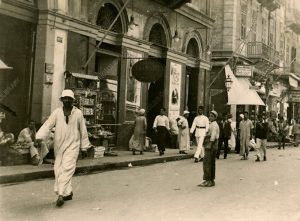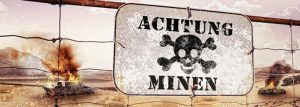We were about to do this when we were summoned by a sergeant-major and he produced four very sinister-looking Arabs and said, “You will escort these men back to the prisoner of war camp which is about 60 miles west of Alexandria. They are suspected of working for the Germans”. This was a serious blow, as it would mean that we would have to take turns on sentry duty in the back of the 30 cwt. truck which was to be our transport. However, we were lucky. The Commander of the convoy said that each night his men would guard the prisoners as they had to guard the convoy anyway. On the first night we spread our blankets beneath the truck and went happily to sleep. We were woken by a sentry at dawn who told us that the prisoners had escaped. As the convoy commander had assumed responsibility for them we were quite relieved to see the back of them. We didn’t give a thought to what the sergeant-major might say as enjoying ourselves in Alexandria was paramount. Fortunately for us we never saw the sergeant-major again, as we all became involved in a desparate battle situation which was to mean a long and difficult retreat for most of the Eighth Army. Alexandria was a welcome relief from the desert, and we made the most of our leave.

On our return, it was decided that our communication with our rear echelons (where all our supplies and spare vehicles were kept) was not satisfactory. I was ordered to take myself and a linesman and set up a Fullerphone link about five miles behind our forward position. We were able to tap our line in to the many which strewed the desert, and I was soon sending and receiving messages between the two positions. After a few days of comparative quiet I and the linesman were awakened soon after dawn by an exploding shell, and on going out of our tent we were astounded to find ourselves in the middle of a tank battle. The Germans had swung south of the Gazala box and were attacking the soft rear echelon targets. I dived back into the tent and sent my last message. I gave it on 0 ii U (very important) priority and simply said we were under heavy attack and would have to close down. Outside there was absolute chaos with tanks rushing about in all directions and nobody seemingly quite sure which of them was the enemy. The linesman and I jumped into our truck and decided to head back to our forward position, judging that as the German spearhead was moving eastward it would be prudent to go west. We arrived back at our camping area to find everyone dug in and prepared for action. We were now surrounded, and that night we watched flashes of guns and flares from all sides. Our job was to try to keep communications alive amongst the various units in the Gazala box, and we even got to man the wirelesses in the few tanks which had got caught in the area. Somehow it seemed slightly safer in a tank than in a hole in the ground as the bombardment intensified. At night we tried to catch a little sleep in our trenches, but as we couldn’t be sure of the possibility of infantry attack we almost dared not close our eyes.
I had the strangest experience during the fourth day of the battle. I was ordered to leave the dug-out to repair a damaged land-line to Headquarters. This line had been cut by shell fire, and the prospect of a half-mile walk over the battlefield was not in the least appealing; During a lull in the bombardment I set off trailing the wire in my left hand until I came to the break. As I reached it, a figure came from out of the semi-darkness trailing the other end of the line. I was certain it was a Lance-Corporal from our unit back at Headquarters. We did not speak but quickly repaired the line, tested it with our instruments, and made our respective ways back to our bases. On reaching our dug-out I tested the line once again and asked to speak to the lance-corporal. To my astonishment I was informed that he had been killed two days previously so, thinking I had mistaken him for someone else, I asked to speak to the man who had repaired the line. I was amazed to be told that no one had been sent out from the Headquarters end. The strain of battles was beginning to tell: Or was it the usual lack of organisation?

The ring around the box got smaller and eventually we were ordered to save ourselves if we could. Abandoning all out kit but keeping our rifles and water-bottles we set off in small groups to try to find a way out. Our group aimed for an area where there seemed to be little gunfire. We were soon to see the reason for this. We arrived on the edge of a minefield. It was a single strip of barbed wire with the ominous sign “Achtung – Minen” displayed in several places. We were caught between the devil and the deep.